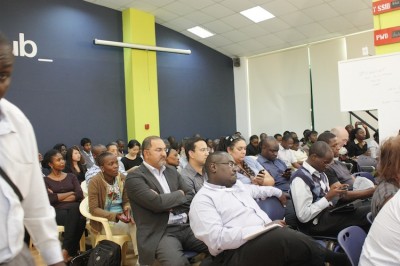Archive for the ‘Uncategorized’ Category
Mobile in East Africa. Is Reality Finally Getting Through?
Last week, an illustrious panel was joined by a reasonably sized audience at the iHub in Nairobi for a no-holds-barred discussion on the question is the Silicon Savannah hype or reality? Andrea Bonstedt triggered the discussion earlier in the week with an article published in The Star that resulted in animated discussions online. Sitting on the panel with Conrad Akunga and Njeri Rionge, she clarified her position on “Not every techie is an entrepreneur”. There’s a good summary of the evenings discussions on the iHub blog and in this follow-up piece by Andrea.
General consensus by the panel was that there’s still a long way to go and more to be done to improve the start-up ecosystem in Kenya. In conversations with a few private equity fund managers over the last week, Andrea’s claims were supported; there is still very little potential within the sector for fund managers to grow their pipelines from tech startups.
Meanwhile, inMobi announced it was scaling down its international operations and closing down offices in Africa and Russia. These markets will now be served by their London office. This at a time when the numbers show mobile penetration as rising exponentially on the continent. In the face of declining ARPU there’s increasing demand for data across Africa and the globe but the growth of smartphones on the continent is still slow. One plus one should equal two. Rising mobile penetration plus increasing demand for data should mean (somewhere in there) that there’s huge potential in the short term for businesses providing content and services on mobile via the internet. In my opinion, the potential is probably bigger than any commentator can say. It’s my view that the problem is in the timing. Apparently, users on the continent are on their own clock and exhibiting online behavior that deviates sufficiently from the norm common in the west as to make it less attractive for businesses like inMobi to justify a physical presence here.
Within this hype-vs-reality quandary lies a question which, due to inadequate answers, is probably one of the biggest reasons tech startups on the continent struggle. What do users in the mass market do with their mobile phones and how do they do it? A study by iHub Research funded by infoDev takes a stab at this problem from a high level perspective providing entrepreneurs planning to launch products/services designed for the mass market with useful analysis.
Hype gives us all something to aspire to. Reality makes sure only products that score well on the utility vs hype ratio stay alive. It’s natural selection at its best. Until we find actionable insights on user behavior related to mobile telephony on the continent we may have little to show but hype. Without actionable insights only chance can produce apps/services people would pay for.
But what can be done to give tech startups in sub Sahara Africa a fighting chance in this difficult operating environment? I can think of three quick ways.
- Less hype more work. I am all for hackathons, pitchfests and all manner of contests that put young entrepreneurs in the lime light. I believe they are an important part of the ecosystem allowing stories to spread and giving young people something to aspire to. Let’s add to these events metrics that reward entrepreneurs who successfully bring to market their products otherwise the only story we tell is about people who build cool things. Let’s also take these events on the road to cities and towns other than Nairobi, Dar es Salaam, Kampala and Kigali.
- Teach shipping. We should find ways of teaching basic entrepreneurship in our institutions so that we help young business owners understand how to build teams and run businesses. That way they know what to look for in someone to run things for them. Most of all, more focus should be put on equipping start-ups with the skills to ship products. It’s pointless building a great app if all it ever does is get whipped out at the next challenge/competition/pitchfest. Get customers or close up shop. Those who end up in formal employment would benefit from these skills as they, by necessity, include focus, project management and strategy.
- Think business. What are we building? Who shall use it? How will we get paid for it? How will they obtain it? How will we support them? How much will it cost us to do this? How will we grow to break even? We need to spend less focus on grants and more focus on building sustainable enterprises that make more money than is spent running them. I am always surprised by the number of tech startup owners who can’t answer 5 out of 7 of the questions above.
- Learn from people. It is difficult to become an expert in a problem users face until you have met them and spoken to them. Building a solution to a problem implies that one understands it enough to be somewhat of an expert on it. Basic design thinking skills coupled with lean methodologies can provide young businesses with the agility they need to learn quickly and launch compelling solutions. Putting your product out in the wild and learning from user experiences and feedback is invaluable to a young business. Leave the attitude at home and go out the door where you can learn from other people.
The reality isn’t pretty. The mobile technology industry in East Africa, though still in its infancy, has come along way already. In this hyper-connected age, we just haven’t come far enough fast enough.
Innovating for the People: How Africa is using Technology for Better Governance.
This post is the forth and last article in a four-part series on Africa: The Present Frontier.
On his first day in office, US President Barrack Obama signed the Memorandum on Transparency and Open Government start the process that led to the Data.gov we know today. Within 3 years, other governments had followed suit around the world with many attempting to do it and others getting past the hurdles to finally launch. The first one in Africa to start the process and deploy an open data portal was Kenya. Other countries are expected to follow suit in the coming months and years.

The Liberia Business Registry which provides an online platform for business registration. Image source: http://www.lbr.gov.lr/
The story of governance in Africa though punctuated by war, coups de etat and not-so-democratic elections is also full of stories of democratic progress and innovation. Technology is playing a role on the demand side of governance with citizens taking to technology platforms to amplify their opinions and demand better services from governments. It’s playing a big role on the supply side as well with governments adopting e-government and making progress along the path to open government and turning Africa into an attractive place to live in and do business.
The IFC in its Doing Business report for 2012 found that every single East African country had made at least one reform aimed at making them an attractive investment destination. Areas such as electronic submission of documents for businesses establishing a presence are important for governments in the East African Community. Sadly, despite the reforms, the 2012 Doing Business ranking show only 2 out of 5 of the EAC states improved their rankings with all the others dropping between 2 and 4 places from 2011. Rwanda remains the 3rd best country to do business on the continent after Mauritius and South Africa at its current 45th position in the rankings. Kenya, at 109, is ranked better than Nigeria, Brazil and India.
The improvements in the EAC have resulted in stronger legal institutions but maintained expensive regulatory processes. However, as these governments implement e-government initiatives and make progress along their respective roadmaps, the costs for businesses and individuals where interactions with government are concerned will reduce and play a role in improving the business environment in the region. This is key to creating employment, reducing poverty, improving the quality of life and growing a country’s GDP. Here are some examples of how countries in the region are using technology to serve citizens and protect the gains made in opening up the democratic space and improving the business environment.
- Kenya Revenue Authority’s (KRA) Portal. Interacting the revenue authority almost always meant a great deal of standing in line and loss of valuable man-hours lost. This created an environment for intermediaries and corruption to thrive resulting in the loss of millions of dollars in revenue every year. The authority implemented a series of measures to make customs, excise and value-added-tax processes convenient, less costly and more water tight through an online platform resulting in a level playing field for business and less citizens standing in line for days to get things done. It also put those pesky ‘brokers’ hanging around government offices offering to ‘help’ out of business.
- Tanzania Revenue Authority e-Filing and mPayments. In a move that created a new precedent in Government to Citizen (G2C) services in sub-Sahara Africa, the Tanzania tax authority implemented a mobile payments tax system which makes it unnecessary for citizens to visit their offices to pay taxes.
- Rwanda Mobile-enabled Driving license applications. In an effort to reduce the amount of time it takes to apply for a driving license in Rwanda, the government introduced a mobile-enabled service that allows citizens to send a text message to the platform and receive a registration number, the first step in the process, cutting the process from 4 months to 45 days.
- Liberia’s Online Company Registry. Liberia’s company registry allows citizens to register a business without having to make trips to government offices usually a standard practice with this bureacractic process.
While some have already done so, a number of countries in sub-Sahara Africa are on the path to introducing electronic lands registries, integrated financial management systems and electronic business registration in an effort to improve service delivery in their government to government (G2G) interactions and G2C / G2B services.
The old Africa is almost no more. There’s a new Africa emerging. One where stronger institutions exist, better legislation, transparency and citizen participation in governance is the norm. The new Africa is here.
Apps for Africa: 3 Reasons To Focus on Mobile
The iTunes App store has had phenomenal success as a content distribution platform starting with music and then moving into magazines, books and software applications. There are currently more than 300,000 apps on offer on the App store and numerous stories of developers who went on to make millions of dollars from publishing the apps to the store. The App store may have been solely responsible for spawning a whole new sub-sector for application development that wasn’t taken very seriously until then. Read the rest of this entry »
TweetHow to Innovate Mobile Services for the Bottom of the Pyramid
Those living at the bottom of the pyramid represent the single largest people group in the world. Businesses that successfully innovate services and products for this space often find success.
Semacraft is hosting a workshop in Nairobi on September 4th on ‘How to Innovate Mobile Services for the ‘Bottom of the Pyramid‘.
TweetAre Brands Social on ‘Social’?
Apparently, not many brands are. I have long argued (ok, maybe only for a year or so) that brands that have a presence in the social media space aren’t necessarily social. Many of them just use social tools to do marketing or PR the same old way.
This article confirms (at least in the UK) my non-scientific research. Setting out to ‘do’ social is not authentic. We have to set out to BE social. Not responding to someone who is obviously talking to you is just plain rude but apparently that hasn’t stopped 43% of the top brands from ignoring tweets completely.
Have a look at this post, very insightful.
Makes me wonder whether brands that aren’t social in social spaces have the cultural capacity within them to deploy Social CRM technology. What do you think?
PS. #scrmpioneer is a great place to join a conversation around Social CRM.

